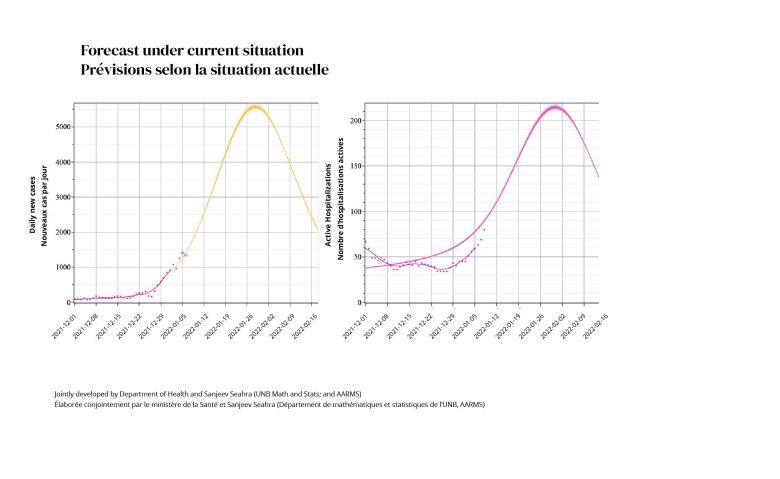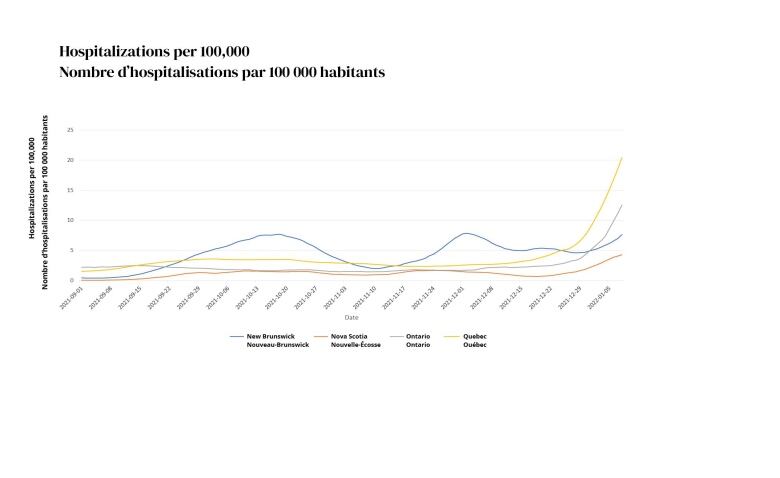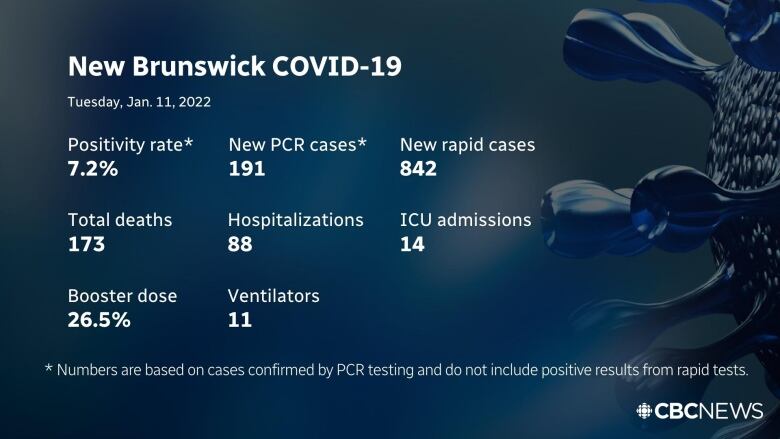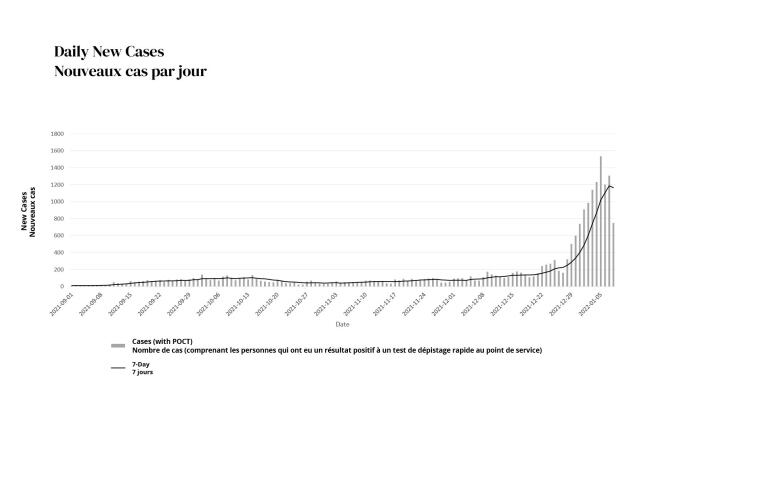N.B. COVID-19 roundup: Province projects 5,500 new cases per day, 220 hospitalizations
New Brunswick hits pandemic record-high hospitalizations, at 88

Latest
- People urged to reduce contacts as much as possible
- 377 health-care workers have tested positive
- 6 COVID outbreaks at Saint John Regional Hospital
- COVID dashboard now includes positive rapid test results
- More than 17,500 booster appointments booked since Monday
- Public Health seeks volunteers
About5,500 New Brunswickersare expected to test positive for COVID-19 daily by the end of January if current trends hold and no changes are made, according to the province's chief epidemiologist.
Hospitalizations could reach nearly 220,Mathieu Chalifouxtold a technical briefing Tuesday.
A record high 88 people are now hospitalizedbecause of the virus, he said, up from 86. That includes 14 people in intensive care,according to the COVID-19 dashboard.
Eleven people are on ventilators, an increase of one.
The virus has also claimed the life of another New Brunswicker a person 90 or over in the Moncton region, Zone 1, Public Health said in a revised news release. This raisesthe pandemic death toll to 173.
"The next few weeks will be intense," Chalifoux said.

Not only will health-care servicesbe affected by the forecasttrajectory but also police,fire and other critical services, such as power, Chalifoux said, noting about 55,000 people could beisolating at any given moment during the projected peak before returning to current levels in about five to six weeks.
Theseprojections could be cut by about one-third if people reduced their contactseither by seeing fewer people, distancing appropriately, or wearing well-fitted masks inside, compared tono changes in public behaviour,said Chalifoux
This is the best way people canprotect their family, reduce strain on the health-caresystem and protect theeconomy, he told the briefing.
A 10 per cent decrease in contacts by Jan. 14 could reduce theprojected new daily cases to about 4,400, while a 20 per cent reduction in contacts could put the numberbelow 3,500, graphics show.
Projected hospitalizations, meanwhile, could drop from 220 to 180 with a 10 per cent contact reduction and to about 150 with a 20 per cent cut.
"We need to assume that everyone we come in contact with could have it," said Chalifoux.

Among the criteria for the province to consider moving from the current Level 2 of theCOVID-19 winter planto Level 3 is100 active COVID-19 hospitalizations provincially or 50 COVID patients in intensive care.
The province is monitoring the situation "hour by hour," but hopes to avoid a lockdownas it tries to balance the risks to the health-care system with thenegative impacts of more restrictive measures, said Dr. Jennifer Russell, chief medical officer of health.
"This briefing today is really around what can the population of New Brunswick do right now, collectively and individually, to protect the health-care system to avoid having us go to Level 3."
People should go to as few places as possible, with as few people as possible and notentertain in their home, Russell advised.
"If you don't absolutely need to spend time with other people in any situation, then don't do it," she said.
Russell also urged people tomake a plan to care for themselves and any family members who becomesick. This includes havingsupplies on hand, such as tissues, a thermometer, pain relief medications, and easy-to-prepare meals, she said.
Dr. France Desrosiers, president and CEO of the Vitalit Health Network, and Dr. John Dornan, interim president and CEO of the Horizon Health Network, also participated in the briefing to provide an update onhospitals, which are at the red COVID alert level, providing emergencyor urgent services only.No politicians tookpart.
"We are at the start of a very high tidal wave," Dornan said. "It's creeping up now, but in the next two or three weeks, it's going to crash over us, like no one's business.
"The worst is yet to come."
A total of 377 health-care workers now haveCOVID-19, and many more are offisolating.

Horizon alone had 164 workers off Tuesday, said Dornan. Some hospitals are in crisis, he said, prompting infected workersto be called back to work sooner.
"Inconventional times, we would say, 'Stay home for 10 days, get a point of care test, then come back in again," he said.
"In all of our hospitals, we are at a contingency approach, which means that after five days of home isolation and you test negative, you can come into work.
"If we are shorter-staffed,and in some of our hospitals, some of our units currently, we are at a crisis level, where we are asking people to come back even earlier than five days." He did not say how many days or whether a negative test is still required.
Of the 88 people in hospital with COVID, 35 tested positive after they were already admitted for other reasons, said Dornan.
The Saint John Regional Hospital has COVID outbreaks on six units, he said.
"We're at a point now where we're not able to contain all of our affected and close-contact patients in one or two areas."
More than 360 Horizon surgeries have been cancelled in the past few weeks, said Dornan.
"We've used the term 'elective' in the past. There's no 'elective' surgery. These are surgeries that need to be done to reduce pain, improve mobility, improve health."

On Monday night, Premier Blaine HiggstoldCBC'sPower & PoliticsNew Brunswick may revisit the issue ofmandatory COVID-19 vaccines.
"I think it's something that will get further discussion in New Brunswick, and probably across the country," he said.
There are 7,347 active cases of COVID-19 across the province, based onPCR(polymerase chain reaction) lab tests, including the 191 new cases reported Tuesday.
But that's not an accurate picture of the virus's spread because PCR tests are now being limited to groups considered atthe highest risk of being hospitalized because of the virus, including people over 50.
If people aged two to 49 have symptoms, they areasked to take a rapid test, which is now being treated as confirmatory. If they test positive, they are asked to register their results online.
An additional 842 positive rapid test results were submitted, Public Health said in a news release.

"While we are encouraging everyone to register their positive rapid-test result, we recognize that not everyone will do so,"Russell said in a statement. "We need to keep in mind that this data is self-reported and will only give us an idea of the actual number of positive cases."
The COVID-19 dashboard has been updated to include rapid-test results. "Further enhancements will be made to the dashboard during the coming weeks," according to the news release.
A total of 642,145 PCR tests have been conducted to date, including 2,657 tests on Monday. That puts the positivity rate at 7.2 per cent.
As of Tuesday,26.5 per centofeligible New Brunswickers havereceived a booster dose, up from 26 per cent, 83.2 per centhavereceived two doses, unchanged, and 90.8 per cent have received one dose, also unchanged.
New Brunswick has had20,890 PCR-confirmed cases of COVID-19, with13,368 recoveries so far.
Booster doses
More than 17,500 people have booked a COVID-19 booster dose appointment since Monday, when eligibility was expanded to include all New Brunswickers 18 and older, as long as five months have passed since their second dose, according to Public Health.
Of the 88 people hospitalized with COVID-19 Tuesday,24 per cent of them had received their booster, said Dr. Jennifer Russell, chief medicalofficer of health.
"So it's not that it eliminates the risk, but it diminishes it greatly," she said.
The other76 per cent of the people hospitalized are either unvaccinated, partially vaccinated, or it hasbeen six months since their last dose, Russell said.
People 30 and older will be giventhe Moderna vaccine for their booster, regardless of which vaccine they received for previous doses.
The limited national supply of Pfizer-BioNTech vaccine will be reservedfor those aged 12 to 29 "becausethe risk of complications in this age group, while very small, is reduced with the Pfizer vaccine," Public Health said in a news release Monday.
"There is no difference in risks between Moderna and Pfizer for people over 30," it said.
People who are eligible for a booster can book an appointment through aregional health network clinicor through aparticipating pharmacy.
Public Health seeks volunteers
Public Health is seeking volunteers in Fredericton and Saint John to "support immediate needs over the next four months," according to an advisory issued Monday by the University of New Brunswick to students and faculty.
Volunteers are needed, it says,to:
- Administervaccines and boosters
- Assist at the assessment and testing centres
- Help with administrative duties and tasks, as needed
"We sincerely thank you for your immediate attention to this urgent call for help. Thank you for doing your part in keeping our community safe."












_(720p).jpg)


 OFFICIAL HD MUSIC VIDEO.jpg)
.jpg)



























































































